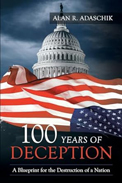
 |
Author Adaschik offers a complex collocation of evidence illustrating that the America of its founders is no longer the country of individual freedom and representative government that those early leaders envisaged. He establishes corroborations for this thesis arrayed in ten initial chapters tracing the gradual diminution of a representative democracy since the year 1913 when the Federal Reserve Act was passed. Adaschik contends that the act was the beginning of a conspiracy among people he refers to as “Banksters”—wealthy individuals whose goal was to control the nation’s (and the world’s) finances for personal gain. In influencing the government to establish the Federal Reserve as the country’s central bank, Banksters were ensuring that they, rather than the American people, oversaw its finances. In the wake of the act came income and wage taxation, harsher work conditions, inflation, and credit/credit cards usage becoming the norm. The funds in question were used, Adaschik states, “to corrupt the entire world.”
One disturbing example offered involves the entry of the US into World War I, instigated covertly by international operatives whose goal was to escalate the fulfillment of the promise of the Old Testament for God’s chosen people to have a permanent national home. In American governance came more legislative changes, such as the nation joining the World Trade Organization, whose rules, as stated, would supersede those of the US Constitution. Throughout, Adaschik emphasizes the damage that has been done to the basic tenets on which America was founded, urging her citizens to acknowledge and consider that premise seriously.
Adaschik, who served in the US military as a Navy fighter pilot and whose education and later career gave him a broad understanding of finance, brings to this work his many observations and open-minded conclusions based on fact and his Christian faith. The ten chapters of the book are historical, political, and didactic, advising readers not to assume that the world they see is the world as it should be. In the appendices, which comprise more than half of this astute and imaginative presentation, the author presents lively themes that reveal varied viewpoints underpinned by his scientifically oriented thinking. These include his assertion that creationism, a belief held by many Christians, is at odds with scientific fact and discovery. He expresses his belief, backed with significant examples, that the Old Testament is not a genuinely historical document, and suggests that followers of a universal God do not need any specific homeland. He takes a logically considered stance regarding legislative decisions of more recent vintage, such as Roe v. Wade, citing their strengths and weaknesses in equal measure. He demonstrates a strong awareness of the ecological damage being done to the planet and the need to conserve resources to preserve it for generations to come.
Adaschik’s writings on such varied but interconnected themes demonstrate his earnest, practiced scholarship, redolent of an overarching spiritual viewpoint, and enhanced by occasional gems of humor. His well-researched explorations and strongly held opinions will doubtless provide salient material for general consideration and specific points for focused workshops, religious discussion, and individual study.
RECOMMENDED by the US Review